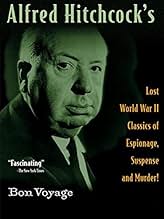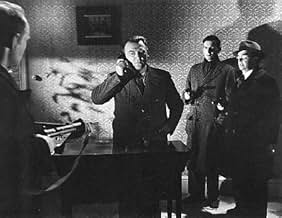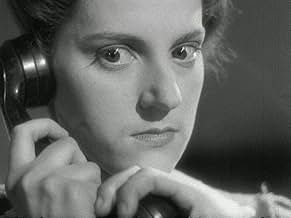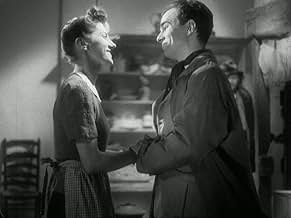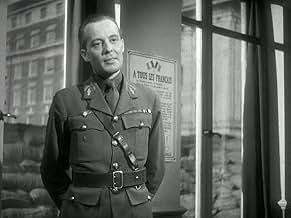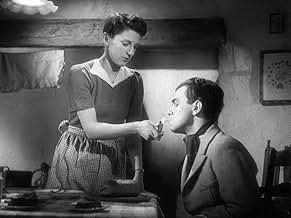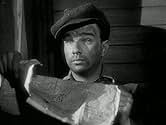VALUTAZIONE IMDb
6,1/10
2083
LA TUA VALUTAZIONE
Aggiungi una trama nella tua linguaA young Scottish R. A. F. Gunner is debriefed by French officials about his escape from occupied territory, and in particular one person who may or may not have been a German Agent.A young Scottish R. A. F. Gunner is debriefed by French officials about his escape from occupied territory, and in particular one person who may or may not have been a German Agent.A young Scottish R. A. F. Gunner is debriefed by French officials about his escape from occupied territory, and in particular one person who may or may not have been a German Agent.
- Regia
- Sceneggiatura
- Star
Recensioni in evidenza
A delightful little propaganda film and more than just a curiosity for Hitchcock fans. The plot is about an RAF pilot who was shot down, escapes through France and is debriefed by French officials. He is helped along in his escape by courageous members of the French Underground and a co-escapist. His recounting of the events which allowed his return to England are given a very interesting spin by the French officials.
A companion with Hitchcock's other WWII French film 'Aventure Malagache,' 'Bon Voyage' was an attempt to buoy French spirits. I love the fact that the film is SUPPOSED to be a celebration of the daring and heroism of ordinary French civilians who've joined the Underground to fight the Nazis. Buried under the surface there are strong suggestions that being part of the underground will probably get you killed and that you should keep your mouth shut because German agents are everywhere. Heroism and sacrifice rule the day though and it is these two things which Hitchcock was attempting to realistically celebrate.
Given a limited showing throughout the Free French regions, 'Bon Voyage' remained a film that Hitchcock was fond of and was a film that Hitchcock considered expanding into a full feature after the war. Although lost in the shuffle and neglected by time, this isn't a bad film. It just remains under-exposed and under-appreciated.
A companion with Hitchcock's other WWII French film 'Aventure Malagache,' 'Bon Voyage' was an attempt to buoy French spirits. I love the fact that the film is SUPPOSED to be a celebration of the daring and heroism of ordinary French civilians who've joined the Underground to fight the Nazis. Buried under the surface there are strong suggestions that being part of the underground will probably get you killed and that you should keep your mouth shut because German agents are everywhere. Heroism and sacrifice rule the day though and it is these two things which Hitchcock was attempting to realistically celebrate.
Given a limited showing throughout the Free French regions, 'Bon Voyage' remained a film that Hitchcock was fond of and was a film that Hitchcock considered expanding into a full feature after the war. Although lost in the shuffle and neglected by time, this isn't a bad film. It just remains under-exposed and under-appreciated.
I have read a couple of message board comments on this film slating another reviewer (who didn't like it) for not understanding its "role" so for fear of upsetting those unable to cope with different opinions let me just say what I understand to be the case. Bon Voyage was one of two short films made by Hitchcock to encourage and bolster the French resistance by putting them at the core of the films and making them in French. It was an important gesture from the famous director and I'm sure was appreciated by those risking their lives in occupied France. However if all I am allow to comment on is its "role" then I should stop the review there.
Fortunately for me, the sight of a "0 of 10 users found this review useful" slogan doesn't bother me at all, so I will do what I normally do and just state my opinion and move on. Other than the war-effort significance, there is not much to this film to recommend it for now. The plot is set up in a terribly stiff device of flashbacks which puts a lot of pressure of the narration another device that doesn't totally work. The story itself has a few twists but the delivery does suck the life out of them and, contrary to what others might say, there isn't much in the way of classic Hitchcock to be had here. The end result is a plodding and simplistic tale that is dull and straightforward.
So by all means, let's hold up Bon Voyage as a worthy effort on the part of Hitchcock and give it its dues in regards supporting the resistance but please let's not pretend that it is a good film worth seeking out because it most certainly is not.
Fortunately for me, the sight of a "0 of 10 users found this review useful" slogan doesn't bother me at all, so I will do what I normally do and just state my opinion and move on. Other than the war-effort significance, there is not much to this film to recommend it for now. The plot is set up in a terribly stiff device of flashbacks which puts a lot of pressure of the narration another device that doesn't totally work. The story itself has a few twists but the delivery does suck the life out of them and, contrary to what others might say, there isn't much in the way of classic Hitchcock to be had here. The end result is a plodding and simplistic tale that is dull and straightforward.
So by all means, let's hold up Bon Voyage as a worthy effort on the part of Hitchcock and give it its dues in regards supporting the resistance but please let's not pretend that it is a good film worth seeking out because it most certainly is not.
"Bon Voyage" is a very short propaganda film about the French resistance which Hitchcock did for the war effort in 1944. It was met with disappointment and later shelved.
The only person billed is John Blythe; the rest are called "The Moliere Players" to protect them from the Nazis.
Blythe plays a Scottish RAF Sgt. John Dougall. He is being debriefed about his escape from France by French intelligence officers in London.
Dougall has escaped from a prisoner of war camp along with Stefan Godowski, who actually put the plan together. The two stick together until there is a Resistance-aided pick-up in France by plane. But only one can go, so they shoot dice for it. Dougall is the one to leave.
Upon meeting with the Intelligence agents, Dougall says that he hopes Godowski made it and wants to know what happened. As it turns out, although the agents wanted Dougall's story about how he was helped along the way, they already knew it.
Good story, but it was too low-key for what the government wanted from Hitchcock - a real rah-rah story and big ending concerning the Resistance.Instead, it showed ordinary people taking risks, which I found moving and effective.
An old woman I knew was in Vienna studying just before the war broke out and, for academic reasons, went looking for Heinrich Mann, who was hiding out in France. (And I just saw a film about this very thing, Varian's War). On the beach, she saw a man and woman playing ball on the beach, and the ball kept landing near her. They turned out to be members of the Resistance.
I believe she did find Mann in a bar somewhere, but what impressed her (and me) is that this couple told her that they would never quit their work until Nazism was defeated.
In the end, I think Hitchcock told the right story. It's not the big triumph but the work that people do leading up to it, sometimes small things, that win a war.
The only person billed is John Blythe; the rest are called "The Moliere Players" to protect them from the Nazis.
Blythe plays a Scottish RAF Sgt. John Dougall. He is being debriefed about his escape from France by French intelligence officers in London.
Dougall has escaped from a prisoner of war camp along with Stefan Godowski, who actually put the plan together. The two stick together until there is a Resistance-aided pick-up in France by plane. But only one can go, so they shoot dice for it. Dougall is the one to leave.
Upon meeting with the Intelligence agents, Dougall says that he hopes Godowski made it and wants to know what happened. As it turns out, although the agents wanted Dougall's story about how he was helped along the way, they already knew it.
Good story, but it was too low-key for what the government wanted from Hitchcock - a real rah-rah story and big ending concerning the Resistance.Instead, it showed ordinary people taking risks, which I found moving and effective.
An old woman I knew was in Vienna studying just before the war broke out and, for academic reasons, went looking for Heinrich Mann, who was hiding out in France. (And I just saw a film about this very thing, Varian's War). On the beach, she saw a man and woman playing ball on the beach, and the ball kept landing near her. They turned out to be members of the Resistance.
I believe she did find Mann in a bar somewhere, but what impressed her (and me) is that this couple told her that they would never quit their work until Nazism was defeated.
In the end, I think Hitchcock told the right story. It's not the big triumph but the work that people do leading up to it, sometimes small things, that win a war.
Coming from someone who considers Alfred Hitchcock her all-time favourite director, both Aventure Malgache and Bon Voyage are interesting curiosities but neither see Hitchcock at his best. While I didn't think much of Aventure Malgache, Bon Voyage was very well-done and you can see why Hitchcock himself was fond of it. The script is lacking in tautness and has a tendency to plod and a couple of the flashbacks flow a little too stiffly, even with those there is much to recommend. While Bon Voyage doesn't quite have Hitchcock all over it or see him show what he was most good at, there is more evidence of his directing style than in Aventure Malgache, the suspense levels are not exactly strong but Bon Voyage is not dull either and has some fun to it. The camera work is clever and meticulously composed and the crisp black and white also impresses. The score is a good mix of haunting and playful, while the story is simpler, much less confused and has some nice twists and turns. Unlike Aventure Malgache, Bon Voyage thankfully is not too dialogue heavy, the French are portrayed more sensitively and the propaganda elements, while also on the dated side, more subtly handled. John Blythe is decent in the lead role. To conclude, not a classic but it is not bad at all and of Hitchcock two French shorts he made in the 40s this is the far superior of the two. 7/10 Bethany Cox
One of two French films Hitchcock made, both during WWII, both propaganda efforts (but not the nasty sort), "Bon Voyage" is a 26 minute long espionage thriller with a mostly uninspired script. It's not a lot of fun to sit through and only really worthwhile for Hitchcock fans or completists... His work here is solid but not remarkable in any way, and while the story is reasonably engaging and the acting good it's all a rather uninspiring and lacking affair. The script's probably to blame, as it's no fun at all when it really should be. A bit of a chore to sit through, to be completely honest.
5/10
5/10
Lo sapevi?
- QuizApart from John Blythe, all of the other actors in this short movie were French, and were simply credited as "The Molière Players" in order to protect their families from the Nazis.
- Citazioni
Free French Colonel: [Last words] It's a dreadful business. Perhaps there'll be another tomb one day under the Arc de Triomphe: The Unknown Civilian.
- Versioni alternativeThere is an Italian edition of this film on DVD, distributed by DNA Srl: "LIFEBOAT (1944) + BON VOYAGE (1944)" (2 Films on a single DVD), re-edited with the contribution of film historian Riccardo Cusin. This version is also available for streaming on some platforms.
- ConnessioniFeatured in WatchMojo: Top 10 War Propaganda Films (2014)
I più visti
Accedi per valutare e creare un elenco di titoli salvati per ottenere consigli personalizzati
Dettagli
- Data di uscita
- Paese di origine
- Lingue
- Celebre anche come
- Щасливої дороги
- Luoghi delle riprese
- Aziende produttrici
- Vedi altri crediti dell’azienda su IMDbPro
- Tempo di esecuzione26 minuti
- Colore
- Proporzioni
- 1.37 : 1
Contribuisci a questa pagina
Suggerisci una modifica o aggiungi i contenuti mancanti

Divario superiore
By what name was Bon Voyage (1944) officially released in Canada in English?
Rispondi
